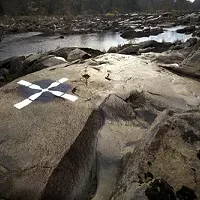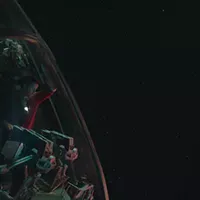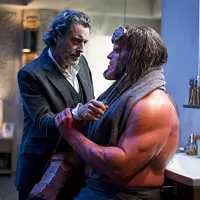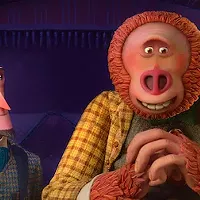

Page 2 of 5
Robert, a diminutive punk who's been teased his entire life, hopes to prove himself a real man -- as much to Jesse as to himself -- but he finds that goal difficult to accomplish. And as he spends more time with Jesse, he realizes that the notorious gunslinger is less an antihero who marches to his own tune than a paranoid, vicious man who's not above beating up teenage boys or shooting someone in the back. In other words, he can be viewed as much a coward as Robert Ford, who earns his moment of infamy when he guns down the feared outlaw from behind.
This version of Jesse James comes from the same school of Westerns as The Man Who Shot Liberty Valance, Unforgiven and Lawrence Kasdan's underrated Wyatt Earp: Hardly a straight shoot-em-up, it instead serves as a commentary on the manner in which Western fact morphed into Western myth even as the ink was still drying on that particular time in American history. It explores the allure of celebrity, using its powerful final half-hour (after Jesse has been killed) to recount how Robert Ford was vilified while Jesse James was elevated to legendary status, even though both men could be perceived as flip sides of the same coin (the movie also suggests that Jesse's murder by Robert was as predetermined from above as Jesus' betrayal by Judas).
Aided by stunning cinematography courtesy of the excellent lensman Roger Deakins (Fargo, A Beautiful Mind) and a music score by Nick Cave and Warren Ellis that grows in stature as the film progresses, The Assassination of Jesse James also benefits from Hugh Ross' sturdy narration, which adds depth to a movie already awash in it. Pitt is generous in his capacities both as an actor and one of the film's producers, making his mark via a skillfully etched portrayal but also allowing a strong supporting cast to share in the spotlight (Sam Rockwell, Jeremy Renner and N.C. School of the Arts grad Paul Schneider are all noteworthy as members of Jesse's gang). Yet top honors go to Casey Affleck, who's as impressive here as he is in Gone Baby Gone. Once a sidekick in movies involving big brother Ben or Gus Van Sant, Casey has graduated with honors to leading man status. Frankly, I didn't even suspect he had it in him.
HOT FROM HELMING last year's After the Wedding (an Oscar nominee for Best Foreign-Language Film), Danish director Susanne Bier returns with her first film in the English language, Things We Lost In the Fire. But if there was any worry that Bier was "going Hollywood," this somber and mature drama immediately quells that notion.
Bier's steady hand behind the camera is enough to overcome the flaws in Allan Loeb's script, which relates the story of a pair of adults whose lives have been altered by a personal tragedy. Audrey Burke (Halle Berry) has just lost her sweet-natured husband Brian (David Duchovny, seen in extensive flashbacks) in a shooting, while Brian's best friend Jerry Sunborne (Benicio Del Toro) has long blown a promising career as a lawyer due to the allure of hard drugs. Audrey has always disliked Jerry, but for various vague reasons -- perhaps to cope with her loneliness, perhaps as a gesture toward her late husband -- she invites him to move into the family's garage. In his new (and nicer) surroundings, Jerry does his best to stay clean, filling up much of his time by bonding with Audrey's two children (Alexis Llewellyn and Micah Berry). But his presence only seems to rankle Audrey, who remains unable to deal with the death of her husband.
Bier, one of the disciples of the Dogme 95 style of moviemaking (basically, a Danish movement that insists on no employment of movie artifice like special effects and soundtracks and maximum use of natural light, hand-held cameras, etc.), has retained some of her European filmmaking instincts to cut down on the melodrama inherent in Loeb's screenplay. She doesn't always succeed -- for instance, one point in the film finds Audrey ordering Jerry to move out, and then acting genuinely surprised that he's back on the streets shooting heroin -- but for the most part, she keeps the excess in check, which in turn leads to scenes that are even more powerful thanks to their subtlety.
Berry does fine work in a rather difficult (i.e. inconsistent) role, yet it's Del Toro's staggering performance that will have tongues wagging throughout award season. Del Toro's face can be a map of emotions, and he's allowed to unfold it freely as Jerry, a decent man who tries to keep smiling even through all the heartbreak. Del Toro gets to showboat in the scenes where his character comes down hard after his high, but it's the smaller moments -- when Jerry flashes a grin at a child, or furrows his brow as he thinks about his deceased friend -- that really allow us to measure the actor's immense talents.
ACROSS THE UNIVERSE
***1/2
DIRECTED BY Julie Taymor
STARS Evan Rachel Wood, Jim Sturgess
THE ASSASSINATION OF JESSE JAMES BY THE COWARD ROBERT FORD
***1/2
DIRECTED BY Andrew Dominik
STARS Brad Pitt, Casey Affleck
THINGS WE LOST IN THE FIRE
***
DIRECTED BY Susanne Bier
STARS Halle Berry, Benicio Del Toro
THE DARJEELING LIMITED
**1/2
DIRECTED BY Wes Anderson
STARS Owen Wilson, Adrien Brody
LUST, CAUTION
**1/2
DIRECTED BY Ang Lee
STARS Tony Leung, Tang Wei.
DAN IN REAL LIFE
**1/2
DIRECTED BY Peter Hedges
STARS Steve Carell, Juliette Binoche
RANDY AND THE MOB
*1/2
DIRECTED BY Ray McKinnon
STARS Ray McKinnon, Lisa Blount
ON THE WEB
TRAILER/PHOTOS: For trailers of the reviewed movies, as well as additional photos, go to www.theclogblog.com.



